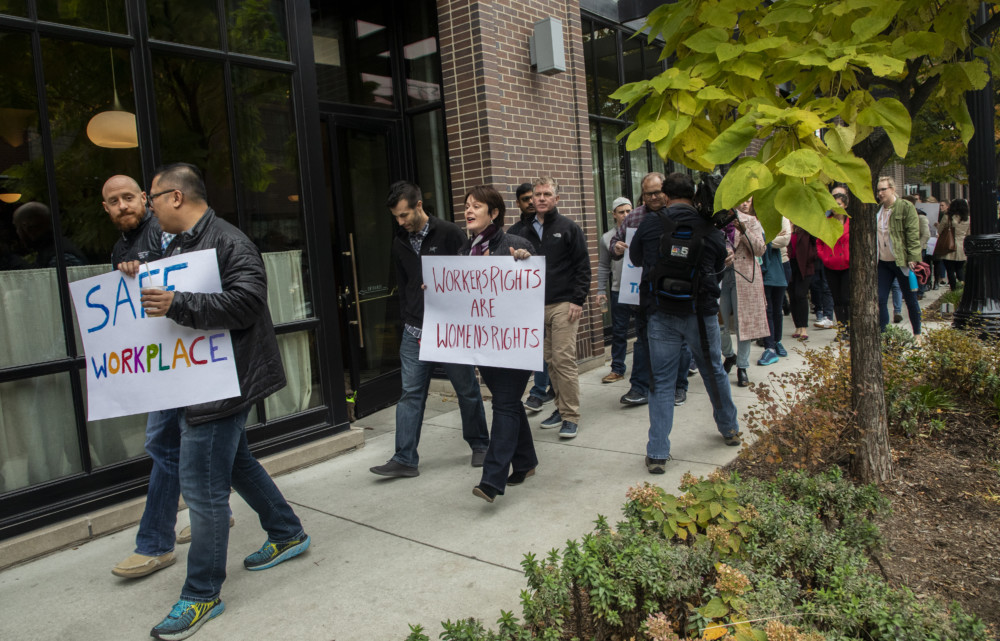By Ethan Baron
The Mercury News
WWR Article Summary (tl;dr) The internal employee revolt was sparked in part by news that Andy Rubin, considered the father of Google’s Android operating system, had received a $90 million golden parachute while being ushered out the door in 2014 over a claim that he’d forced an employee into sexual activity, a claim Rubin has denied.
The Mercury News
Google released a new policy Thursday ending forced arbitration in cases of sexual harassment and sexual assault, satisfying a key demand of protesters angry over its response to sexual misconduct in the workplace. But the company did not agree to all the rebel Googlers’ demands.
Issuance of the new policy followed unprecedented public acts of defiance that saw thousands of Google employees worldwide walk off their jobs last week.
According to Google’s new policy, arbitration in sexual harassment and sexual assault cases will now be optional.
That gives aggrieved employees the right to sue and air a dispute in a public court process, an outcome that large companies increasingly seek to avoid through arbitration agreements.
“We recognize that we have not always gotten everything right in the past and we are sincerely sorry for that,” Google CEO Sundar Pichai said in a letter to employees. “It’s clear we need to make some changes.”
The internal employee revolt was sparked in part by news that Andy Rubin, considered the father of Google’s Android operating system, had received a $90 million golden parachute while being ushered out the door in 2014 over a claim that he’d forced an employee into sexual activity, a claim Rubin has denied.
The New York Times reported that Google protected three executives from accountability for sexual misconduct.
Google responded that it’s fired 48 employees for sexual harassment in the past two years, giving none of them severance.
At the protest in Mountain View, one Googler took the microphone to tell the crowd she’d been sexually harassed by a company executive but it took three years and complaints from many more women before the company got rid of him.
Another woman told the audience a co-worker had complimented her on her lipstick, then asked her to lick her lips.
The Mountain View digital advertising giant also conceded to the protesters’ demand that people complaining to HR about sexual misconduct be allowed to bring a companion to those meetings.
And it will add a section to its annual “investigations report,” which is accessible to all Google employees. The new section will “show the number of substantiated or partially substantiated concerns over time, by function,” Google said.
“It will also discuss trends, disciplinary actions taken, and substantiation percentages. We’ll also summarize, in this annual report, the types of behavior we do and do not terminate employees for.”
But the firm did not go along with the organizers’ demand that an employee be placed on the company’s board. Nor did it agree to extend all the elements of the new policy to temporary workers, vendors and contractors (TVCs).
“Sundar ignored the demand for a worker to be represented on the board and TVCs continue to have no adequate protections from sexual harassment, who make up over half the google workforce and are disproportionately women and people of color,” tweeted the Tech Workers Coalition, which represents tech employees and service workers in tech firms.
Protest organizers could not immediately be reached for comment.
Google said that about 20 percent of harassment complaints arise from situations in which drinking alcohol was a factor, and the company says over-consumption of alcohol will now be “strongly discouraged.”
Additionally, the company appeared to suggest that its “mandatory” anti-sexual harassment training has not actually been compulsory: Starting next year, Googlers who fail to take the training will get docked one rating level in their performance review, so there will be “real consequences for not doing training,” the company said.














































































































































































































































































































































































